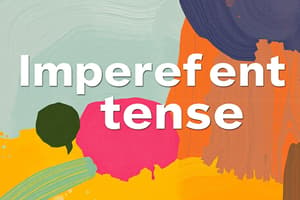Podcast
Questions and Answers
What is the yo form of ir in the imperfect?
What is the yo form of ir in the imperfect?
- ibas
- iba (correct)
- iba (correct)
- íbamos
What is the tú form of ir in the imperfect?
What is the tú form of ir in the imperfect?
- íban
- íbamos
- ibas (correct)
- iba
What is the él/ella/usted form of ir in the imperfect?
What is the él/ella/usted form of ir in the imperfect?
- ibas
- iba (correct)
- iban
- íbamos
What is the nosotros form of ir in the imperfect?
What is the nosotros form of ir in the imperfect?
What is the ellos/ellas/ustedes form of ir in the imperfect?
What is the ellos/ellas/ustedes form of ir in the imperfect?
What is the yo form of ser in the imperfect?
What is the yo form of ser in the imperfect?
What is the tú form of ser in the imperfect?
What is the tú form of ser in the imperfect?
What is the él/ella/usted form of ser in the imperfect?
What is the él/ella/usted form of ser in the imperfect?
What is the nosotros form of ser in the imperfect?
What is the nosotros form of ser in the imperfect?
What is the ellos/ellas/ustedes form of ser in the imperfect?
What is the ellos/ellas/ustedes form of ser in the imperfect?
What is the yo form of ver in the imperfect?
What is the yo form of ver in the imperfect?
What is the tú form of ver in the imperfect?
What is the tú form of ver in the imperfect?
What is the él/ella/usted form of ver in the imperfect?
What is the él/ella/usted form of ver in the imperfect?
What is the nosotros form of ver in the imperfect?
What is the nosotros form of ver in the imperfect?
What is the ellos/ellas/ustedes form of ver in the imperfect?
What is the ellos/ellas/ustedes form of ver in the imperfect?
Flashcards are hidden until you start studying
Study Notes
Irregular Imperfect Verbs in Spanish
-
"Iba" is the yo form of the verb "ir" (to go) in the imperfect tense, indicating ongoing or habitual actions in the past.
-
"Ibas" represents the tu form of "ir" in the imperfect, also used for continued actions or actions that were regularly occurring.
-
"Iba" is repeated for the el/ella/usted form of "ir" in the imperfect, showing that it maintains the same form as yo.
-
"Íbamos" is the nosotros form of "ir" in the imperfect, used for describing actions performed collectively in the past.
-
"Iban" is the ellos/ellas/ustedes form of "ir" in the imperfect, used for plural subjects engaging in past ongoing actions.
-
"Era" is the yo form of the verb "ser" (to be) in the imperfect tense, used to describe states or characteristics in the past.
-
"Eras" is the tu form of "ser" in the imperfect, indicating similar past characteristics or states for the second-person singular.
-
"Era" is repeated for the el/ella/usted form of "ser," indicating consistent use across different subjects.
-
"Éramos" represents the nosotros form of "ser," highlighting collective states or characteristics in the past.
-
"Eran" is the ellos/ellas/ustedes form of "ser" in the imperfect, used for plural subjects.
-
"Veía" is the yo form of the verb "ver" (to see) in the imperfect, signifying ongoing or habitual actions related to seeing.
-
"Veías" is the tu form of "ver" in the imperfect, used to represent second-person past viewing.
-
"Veía" appears again for el/ella/usted, highlighting the consistent form across singular subjects.
-
"Veíamos" signals the nosotros form of "ver," emphasizing group experiences from the past.
-
"Veían" is the ellos/ellas/ustedes form of "ver," applied to plural subjects recalling past visual experiences.
Studying That Suits You
Use AI to generate personalized quizzes and flashcards to suit your learning preferences.




